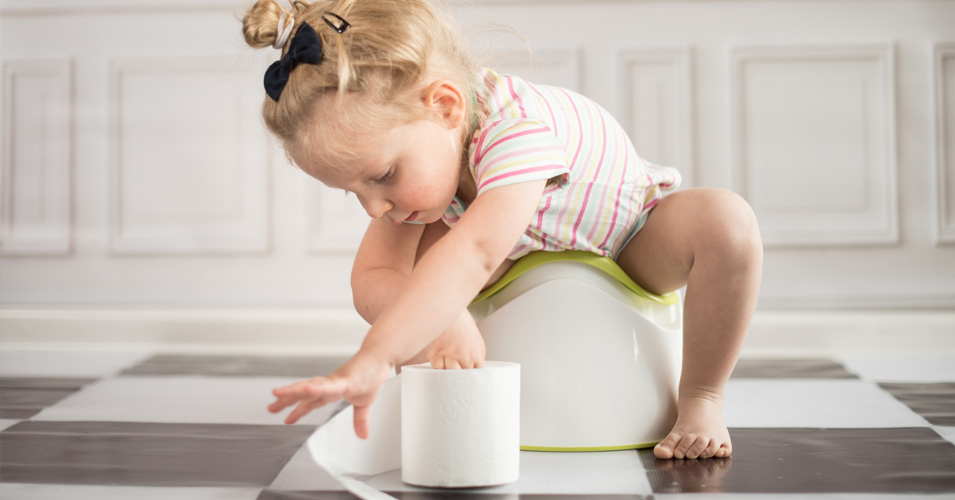The pee-pee dance. There, I said it. And you know what I’m talking about. You’ve seen it, if not danced by your kid, then by another. The hip shake, the hopping on one foot, the squirmy knees: These are universal signs that a kid has to go.
Well, did you know that even the younger baby or toddler, pre-potty training, shows similar signals of having to use the bathroom? You’ve probably heard a baby grunt, or seen a toddler crouch behind a chair. You know the faces, the wriggles, even the smells.
There is a whole range of signals little ones use to communicate their need to potty. By recognizing these signals, and acting on our observations, we can actually make potty training easier, for the child and for us.
There are several categories of signals. The first is audible and visual signs. These include noises like whining, squawking and blowing raspberries, as well as gestures like squirming; trying to “escape” a baby carrier, bouncer or other seat; and sudden fussiness (or sudden stillness!) and staring off into space.
Mobile babies and toddlers might have a favorite place to hide when they have to go; behind a couch or under a table are popular places. Some tots’ bodies follow daily rhythms, and so timing comes into play.
Do you find yourself with a diaper to change first thing when baby wakes up? Or a little while after a meal? These transition times are another set of signals, to you and your babe, that it’s time to go. If you keep these signals and times in mind, and even record the times you notice your kid needing a new diaper, chances are you’ll pick up a pattern.
So what to do when you encounter one of these signs or occasions in your day? The answer is simple: Acknowledge the moment. This can be as quick as a mental note to yourself that you should break for a diaper change. Even better, you can tell your child that you know he might have to go potty, and you will help him soon.
And you can even offer the potty to him to give him a chance to pee or poop there, instead of in the diaper. It’s easy to do this at home, where you might have a tiny potty or toilet seat reducer at hand. When you’re out and about, just try to find the closest bathroom you can. You can hold your child over the big toilet, or help him balance as he sits, and either he’ll have saved it for the potty, or you can quickly change his diaper and move on with your day.
Now, here’s the real catch: Tuning in to these signals, and acting on them, prepares your toddler for official potty training. Changing a diaper right away helps baby preserve her instinct not to soil herself, so when it comes time to potty train, she already “knows” that she doesn’t want to be wet.
Using the language of potty training early on (talking about pee, poop and potty) helps normalize these words and functions and can reduce fear and shame about bathroom business. Respecting her signals and reassuring her that being clean and dry is a priority for both of you, whether just verbally or by taking her to the potty, gives your child an advantage when it comes to potty training and promotes her cooperation with you on that front. Other bonuses include reduced diaper rash and increased self-confidence for the child, and deeper trust in your relationship.
Of course there is no one right way to raise our children. I encourage all parents to do what works for them; our children are understanding and adaptable, and there is plenty of love to go around.
Most kids will potty train well before kindergarten; there are things we can do, though, to help accelerate and smooth this potty-learning process. Learning, observing and responding to our children’s signals helps reduce the parent-toddler power struggles, and empowers our children to trust themselves and honor their bodies.
When we allow our children to take an active role in caring for this primal need, we let them know that we are partners together in their upbringing and that we want to help them succeed in every way. As we learn, we will definitely take false steps, but if we pay attention, we can more joyfully celebrate the rhythms of our lives. And now if you’ll excuse me, I’ve gotta go.



